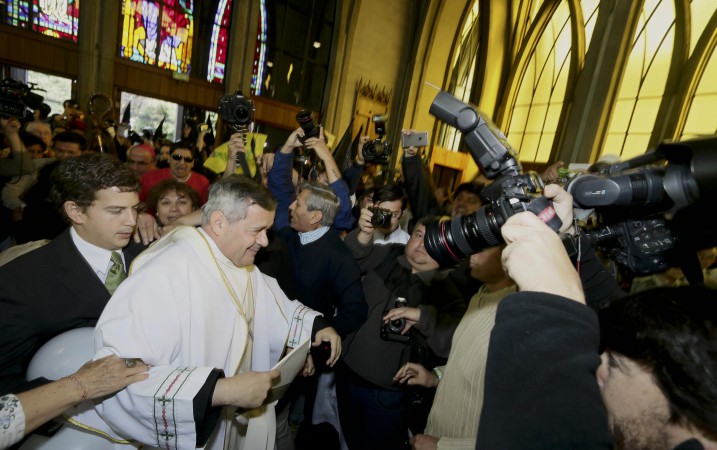Pope Francis May Be Nearing a Tipping Point on Sexual Abuse
By John L. Allen
Staffers in the Vatican paid to think about such things sometimes sit around trying to identify possible tipping points in the public romance with Pope Francis, meaning a calamity that might put a serious dent in his high approval ratings. One no-brainer on the list would be a perception that he’s backtracking on “zero tolerance” when it comes to sexual abuse in the Church, and two recent story lines suggest it’s not an abstract worry. First, Nicole Winfield of the Associated Press reported on Thursday that five members of the pope’s own anti-abuse commission have expressed “concern and incredulity” that Bishop Juan Barros has been given command of the Diocese of Osorno in Chile, despite his public record of defending the country’s most notorious abuser priest. Those objections came on top of protests that forced Barros’ installation Mass to be cut short, as well as ongoing efforts by clergy and laity to ask Francis to rethink the appointment. Second, an Argentine woman named Julieta Anazco, who alleges abuse by a priest in the La Plata archdiocese more than 30 years ago, recently said that she sent a letter to Francis asking for his help, but has not received a response. Anazco, who says she repressed memories of the abuse until recently, has told reporters that she has tried to meet Church officials back home but got the impression they’re not interested. (Church officials claim they tried to schedule a sit-down three times, without success.) In a recent statement, Anazco asserts that “zero tolerance” doesn’t apply in Argentina. Of the two developments, the second seems less serious in terms of raising questions about the pope. The abuse did not take place in Buenos Aires, the archdiocese Francis led prior to his election, so there’s no question of his role in supervising the priest. Further, Anazco says she dropped her letter in a mailbox in St. Peter’s Square, so it’s not even clear if it reached the pope. It would be a relatively simple matter for Francis to ask someone to hear her out, though since she’s communicating through attorneys, it might require a bit of back-and-forth. The Barros case, on the other hand, appears graver. In the first place, it raises questions about the vetting process for bishops. How is it that Italian Archbishop Ivo Scapolo, the pope’s ambassador in Chile, didn’t see this coming and spare everyone the embarrassment? In an interview with a Chilean news outlet on Thursday, Scapolo insisted that he didn’t hide anything from the Vatican in preparing the appointment. He said Francis confirmed it, and claimed that calls for Barros to be ridden out of town on a rail violate religious freedom. All that may well be the case, but it still doesn’t explain why a clean record on the abuse scandals isn’t an absolute prerequisite for a leadership position in the Catholic Church in 2015. (Barros was already a bishop, so the move to Osorno was a transfer.) In addition, the situation also raises questions about the oft-proclaimed commitment of Pope Francis and his Vatican team to accountability, not just for personnel who commit abuse, but also for bishops and other supervisors who cover it up or defend the guilty. A perceived lack of accountability is “Exhibit A” for critics who believe the Church hasn’t done enough, and both Pope Francis and Cardinal Sean P. O’Malley of Boston, the president of the pope’s anti-abuse commission, have pledged that the gap will be filled. In this case, Barros has said he never knew of abuse committed by his mentor, the Rev. Fernando Karadima, and that when the Vatican found Karadima guilty in 2011, he accepted the verdict. Some victims, however, claim that Barros was present when some of their abuse occurred. The bishop’s defense obviously should be part of a serious inquest, but the question remains of why Francis would assign Barros a new position before doubts have been laid to rest. Finally, the Barros situation is worrying for Francis because members of his own anti-abuse commission have broken ranks, including the two abuse survivors on the panel: Marie Collins of Ireland and Peter Saunders of the United Kingdom. It’s not clear if Francis fully grasped this at the time, but when he named survivors to that group, he was handing them significant control over his reputation. If Collins and Saunders were ever to walk out, saying they’d lost confidence or feeling that they’d been exploited for a PR exercise, it would have a vast media echo. No member hinted at such a step in their comments to the AP. Collins, however, was sharply critical: “The voice of the survivors is being ignored,” she said, “the concerns of the people and many clergy in Chile are being ignored and the safety of children in this diocese is being left in the hands of a bishop about whom there are grave concerns for his commitment to child protection.” Left unaddressed, it’s not difficult to imagine a scenario in which her frustration mounts to a point where she feels she has no choice but to quit. Of course, popes can’t make decisions merely on the basis of public opinion, and in any event, when it comes to fighting sexual abuse, it shouldn’t require a poll to discern the right thing. Yet popes can’t afford to ignore popular sentiment either, and this may be a time when Francis needs to send a signal that he’s listening.
|
.
Any original material on these pages is copyright © BishopAccountability.org 2004. Reproduce freely with attribution.
